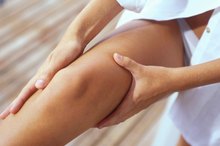What does fact checked mean?
At Healthfully, we strive to deliver objective content that is accurate and up-to-date. Our team periodically reviews articles in order to ensure content quality. The sources cited below consist of evidence from peer-reviewed journals, prominent medical organizations, academic associations, and government data.
- Endocrinologia Japonica: Effect of Vitamin E on Function of Pituitary-gonadal Axis in Male Rats and Human Subjects
- Endocrinologia Japonica: Effect of Vitamin E on Function of Pituitary-gonadal Axis in Male Rats and Human Subjects
- Oxidative Medicine and Cellular Longevity: Antioxidant Systems and Oxidative Stress in the Testes
- Oxidative Medicine and Cellular Longevity: Antioxidant Systems and Oxidative Stress in the Testes
- Biological Trace Element Research: Effects of Magnesium Supplementation on Testosterone Levels of Athletes and Sedentary Subjects at Rest and After Exhaustion
- Biological Trace Element Research: Effects of Magnesium Supplementation on Testosterone Levels of Athletes and Sedentary Subjects at Rest and After Exhaustion
- The Prostate: Time Course of Serum Testosterone and Luteinizing Hormone Levels after Cessation of Long-term Luteinizing Hormone-releasing Hormone Agonist Treatment in Patients with Prostate Cancer
- The Prostate: Time Course of Serum Testosterone and Luteinizing Hormone Levels after Cessation of Long-term Luteinizing Hormone-releasing Hormone Agonist Treatment in Patients with Prostate Cancer
- Biological Trace Element Research: Testosterone Levels in Athletes at Rest and Exhaustion: Effects of Calcium Supplementation
- Biological Trace Element Research: Testosterone Levels in Athletes at Rest and Exhaustion: Effects of Calcium Supplementation
- FEBS Letters: Potassium Regulates Plasma Testosterone and Renal Ornithine Decarboxylase in Mice
The information contained on this site is for informational purposes only, and should not be used as a substitute for the advice of a professional health care provider. Please check with the appropriate physician regarding health questions and concerns. Although we strive to deliver accurate and up-to-date information, no guarantee to that effect is made.
Does Eating Almonds Raise Your Testosterone Levels?
Diet can play a big role in how the body synthesizes testosterone. Certain vitamin and mineral deficiencies can lead to lower testosterone levels, while getting an abundance of these nutrients can help raise them. Almonds are high in a number of beneficial nutrients that may aid in testosterone production.
If you are experiencing serious medical symptoms, seek emergency treatment immediately.
Vitamin E
Almonds are rich in vitamin E, with a one-ounce serving of raw almonds--about 30 nuts--providing 40 percent of your recommended daily value (DV). (See Ref. 1) Vitamin E is an antioxidant, which means it can help combat oxidative stress within the body 3. Oxidative stress is known as a major cause of impaired testicular function in males and, thus, reduced sperm production and testosterone levels. (See Ref. 3, "Vitamins C and E") ). A study published in the journal Endocrinologia Japonica found rats given extra vitamin E were able to significantly increase testosterone levels. (See Ref. 2)
Luteinizing Hormone-Releasing Hormone
Can Certain Vitamins Help Weak Leg Muscles?
Learn More
Vitamin E also stimulates the release of a hormone known as luteinizing hormone-releasing hormone (LHRH). (See Ref. 1) In both males and females LHRH is essential to reproduction, triggering ovulation in women and testosterone production in men. (See Ref. 5) A study published in the journal "Prostate" in 2006 concluded that LHRH therapy is remarkably effective at raising serum testosterone concentrations, with the effect lasting a significant time after LHRH therapy stopped 6. (See Ref. 7) Since almonds are a good source of vitamin E, they can also up LHRH levels.
- Vitamin E also stimulates the release of a hormone known as luteinizing hormone-releasing hormone (LHRH).
- ( 5) A study published in the journal "Prostate" in 2006 concluded that LHRH therapy is remarkably effective at raising serum testosterone concentrations, with the effect lasting a significant time after LHRH therapy stopped 6 Since almonds are a good source of vitamin E, they can also up LHRH levels.
Magnesium
Magnesium is another nutrient that could raise testosterone levels 5. Almonds contain 77 milligrams of magnesium per serving, about a quarter of the DV for women and 18 percent of the DV for men. In a 2011 study published in "Biological Trace Element Research," magnesium supplementation of 10 milligrams per day for four weeks was found to increase testosterone levels in both sedentary individuals and athletes 57. The advantage was found to be greater for people who exercised. (See Ref. 6)
Calcium and Potassium
Vitamins to Improve Sperm Motility
Learn More
Almonds aren't great sources of calcium or potassium, but they're not bad sources either. One serving contains about 208 milligrams potassium and 76 milligrams calcium. (See Ref. 4) Both minerals may play a role in regulating testosterone. A 2009 study published in "Biological Trace Element Research" found calcium supplements capable of raising testosterone levels in adult males (See Ref 57. 8). And animal research has linked potassium deficiency to dramatic decreases in male testosterone, though no significant changes were seen in females. (See Ref. 9)
- Almonds aren't great sources of calcium or potassium, but they're not bad sources either.
- A 2009 study published in "Biological Trace Element Research" found calcium supplements capable of raising testosterone levels in adult males (See Ref 5
Related Articles
References
- Timothy Ferriss: The 4-hour Body
- Endocrinologia Japonica: Effect of Vitamin E on Function of Pituitary-gonadal Axis in Male Rats and Human Subjects
- Oxidative Medicine and Cellular Longevity: Antioxidant Systems and Oxidative Stress in the Testes
- USDA National Nutrient Database: Nuts, Almonds
- Biological Trace Element Research: Effects of Magnesium Supplementation on Testosterone Levels of Athletes and Sedentary Subjects at Rest and After Exhaustion
- The Prostate: Time Course of Serum Testosterone and Luteinizing Hormone Levels after Cessation of Long-term Luteinizing Hormone-releasing Hormone Agonist Treatment in Patients with Prostate Cancer
- Biological Trace Element Research: Testosterone Levels in Athletes at Rest and Exhaustion: Effects of Calcium Supplementation
- FEBS Letters: Potassium Regulates Plasma Testosterone and Renal Ornithine Decarboxylase in Mice
- Volek, J. S., Kraemer, W. J., Bush, J. A., Incledon, T., & Boetes, M. (1997). Testosterone and cortisol in relationship to dietary nutrients and resistance exercise. Journal of Applied Physiology, 82(1), 49-54.
- Wang, C., Catlin, D. H., Starcevic, B., Heber, D., Ambler, C., Berman, N., ... & Swerdloff, R. S. (2005). Low-fat high-fiber diet decreased serum and urine androgens in men. The Journal of Clinical Endocrinology & Metabolism, 90(6), 3550-3559.
- Heller, R. F., Wheeler, M. J., Micallef, J., Miller, N. E., & Lewis, B. (1983). Relationship of high density lipoprotein cholesterol with total and free testosterone and sex hormone binding globulin. Acta Endocrinologica, 104(2), 253-256.
- Blesso, C. N., Andersen, C. J., Barona, J., Volek, J. S., & Fernandez, M. L. (2013). Whole egg consumption improves lipoprotein profiles and insulin sensitivity to a greater extent than yolk-free egg substitute in individuals with metabolic syndrome. Metabolism, 62(3), 400-410.
- Steels, E., Rao, A., & Vitetta, L. (2011). Physiological Aspects of Male Libido Enhanced by Standardized Trigonella foenum-graecum Extract and Mineral Formulation. Phytotherapy Research, 25(9), 1294-1300.
- Prasad, A.S., et al. (1996). Zinc status and serum testosterone levels of healthy adults. Nutrition, 12, 344.
- Topo, E., Soricelli, A., DâAniello, A., Ronsini, S., & DâAniello, G. (2009). The role and molecular mechanism of D-aspartic acid in the release and synthesis of LH and testosterone in humans and rats. Reproductive Biology and Endocrinology, 7(120), 1482-1488.
- Wehr, E., Pilz, S., Boehm, B. O., Marz, W., & Obermayer?Pietsch, B. (2010). Association of vitamin D status with serum androgen levels in men. Clinical endocrinology, 73(2), 243-248.
- ZELIGS, M. A. (1998). Diet and estrogen status: the cruciferous connection. Journal of Medicinal Food, 1(2), 67-82.
- Shaner, A. A., Vingren, J. L., Hatfield, D. L., Budnar Jr, R. G., Duplanty, A. A., & Hill, D. W. (2014). The acute hormonal response to free weight and machine weight resistance exercise. The Journal of Strength & Conditioning Research, 28(4), 1032-1040.
- Kraemer, W. J., Marchitelli, L., Gordon, S. E., Harman, E., Dziados, J. E., Mello, R., ... & Fleck, S. J. (1990). Hormonal and growth factor responses to heavy resistance exercise protocols. Journal of Applied Physiology, 69(4), 1442-1450.
Writer Bio
Brian Lewis began writing in 1998. His published works appear in the "Ellensburg Daily Record," "South County Journal," "Seattle Times" and "Northwest Anglers" as well as on ESPN.com. Lewis has written concert and travel reviews and poetry and short stories. He has a Bachelor of Arts in communications from the University of Washington.









